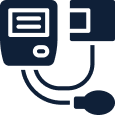Myocardium
What is cardiomyopathy?
The heart is a muscular pump that is responsible for maintaining blood circulation. ‘Cardiomyopathy’ refers to heart muscle disorder or dysfunction. There are several types of cardiomyopathies.
Cardiomyopathy can generally be divided into four main categories:
- Ischaemic cardiomyopathy and dilated cardiomyopathy – where the heart muscle weakens over time either due to damage from blocked heart arteries (ischaemic cardiomyopathy) or other causes such as genetic conditions and atrial fibrillation.
- Hypertrophic cardiomyopathy (HCM) – Where the heart muscle becomes abnormally thick due to genetic condition.
- Restrictive cardiomyopathy – where heart function is restricted due to stiffened ventricles.
- Other less common conditions include: Arrhythmogenic right ventricular cardiomyopathy (ARVC), peripartum cardiomyopathy, chemotherapy or drug related cardiomyopathy, Cardiac valve dysfunction related cardiomyopathy, desmoplakin cardiomyopathy and Takotsubo cardiomyopathy.
What causes cardiomyopathy?
Common causes of cardiomyopathy include:
- Genetic causes can result in Idiopathic cardiomyopathy, HCM and ARVC
- Coronary artery disease can result in Ischaemic cardiomyopathy. This is due to narrowed or blocked blood vessels that damages the heart muscle causing them to weaken
- Arrhythmias such as atrial fibrillation (AF mediated cardiomyopathy), premature ventricular complexes (PVC) mediated cardiomyopathy or prolonged abnormal rapid heart rhythms (tachy-cardiomyopathy)
- Alcohol and poorly controlled blood pressure
- Peripartum cardiomyopathy – Occurs during or after pregnancy and often improves with time
- Chemotherapy – Certain types of chemotherapy can be toxic to heart muscle
- Drugs – Drugs such as amphetamines and cocaine can lead to cardiomyopathy
- Other conditions: Sarcoidosis, Amyloidosis
What are the consequences of cardiomyopathy?
There is a wide range of implications with cardiomyopathy. The impact on your well-being is dependent on type of cardiomyopathy and severity.
In the vast majority, your condition can be effectively managed with appropriate education, awareness, medications, and interventions. Some will need lifelong monitoring, medications, and interventions. In general, reversible conditions carry an excellent prognosis with adherence to medical therapy and recommendations.
Each type of cardiomyopathy will have its’ own management implications. Please speak with your physician about them in more detail.
What is heart failure and how is it related to cardiomyopathy?
Cardiomyopathy is a clinical condition diagnosed based on investigations. Cardiomyopathy can lead to a condition called heart failure. Heart failure refers to the condition when the heart does not pump blood as well as it is mean to. This is the clinical consequence of cardiomyopathy resulting in symptoms such as shortness of breath and fluid overload.
The bottom chambers (ventricles) of the heart act as muscular pump that fills with blood which is then squeezed out to supply the body with fresh oxygenated blood. The ventricles then relaxes where it fills with blood again. Both these phases are important. The squeezing function of the heart is estimated by some tests and is called the ejection fraction (EF).
Heart failure can be generally divided into heart failure with reduced ejection fraction (HFrEF) and heart failure with preserved ejection fraction (HFpEF). Heart failure generally results from either heart being unable to supply adequate blood to the organs due to poor function or effects of excess fluid building up due to heart’s inability to effectively circulate the blood. These are often intertwined and difficult to separate.
How do you diagnose cardiomyopathy and heart failure?
Common tests required to diagnose your condition include echocardiogram, stress test, Holter monitors, Electrocardiogram, Coronary angiogram, cardiac magnetic resonance imaging (MRI), computed tomography (CT) scans, blood test, chest X-ray and rarely a cardiac biopsy.
What would I feel with heart failure?
Symptoms and signs of heart failure can vary from mild to severe. They include:
- Shortness of breath
- Fatigue
- Decreased exercise capacity
- Swelling in your legs
- Weight gain
- Abnormal heart rhythms
- Chest pains
How do you treat heart failure?
Treatment will depend on the type, reason for your heart failure, severity of symptoms and the condition of your heart. This is often a very complex process, and one size does not fit all. The treatment and recommendations vary and change over time depending on your progress. In many cases it is a trial and error.
Awareness, education, and treatment adherence are critical in effective management of heart failure. Management decisions are individualised to your specific condition and situation. Some key strategies include adequate fluid management, exercise, rehabilitation, and monitoring.
In people with heart failure with reduced ejection fraction (HFrEF), some of the common medications and interventions include:
- Diuretics: such as frusemide to assist in removing excess fluid
- Beta blockers: These can serve more than one purpose. Studies have shown improvement in heart function with beta blockers. They can slow the pulse and can decrease blood pressure as well.
- Angiotensin converting enzyme inhibitors (ACEi) / Angiotensin receptor clockers (ARB): Studies have shown improvement in heart function with ACEi and ARBs. They can decrease blood pressure.
- Sacubitril: Studies have shown improvement in clinical outcomes with ARB and sacubitril combination
- Gliflozins: Gliflozins are a type of medications called sodium-glucose co-transporter 2 inhibitors. Studies have shown improved outcomes with gliflozin type medications.
- Other medications: Ivabradine and digoxin
- Less commonly interventions maybe required. They include coronary angiogram, percutaneous coronary intervention (PCI), cardiac surgery, catheter ablations for abnormal heart rhythms, implantable cardioverter defibrillator (ICD), special pacemakers such as cardiac resynchronisation therapy (CRT) and very rarely left ventricular assist devices and cardiac transplantation.
What can I do if I have heart failure?
In many cases, you are the most important person who can manage your heart failure effectively. You need to take a proactive role in the management of your condition.
Lifestyle changes: maintain a healthy weight, eat a heart healthy diet, limit alcohol, quit smoking and be physically active.
Cardiac rehabilitation measures: Participate in cardiac rehabilitation program which provides support, education and resources important in managing your condition.
Medicine: Adhere to prescribed medications is important – specifically fluid medications.





